Monographs
A complete overview of the publications by the Institute of Social Studies from recent years can be found in the Estonia Research Information System (ETIS) which enables searching for publicised research by institute and sorting by authors, publication year or edition title.
Some of the most notable publications by ISS researchers from recent years include:
The book Datafied Childhoods. Data Practices and Imaginaries in Children's Lives which was co-authored by Andra Siibak, professor of media studies at the University of Tartu, and Giovanna Mascheroni (Università Cattolica) discusses the ways that growing up in a digital and data-based society affect children’s development. It is the first extensive insight into the phenomenon of the datafied childhood. In the book, Mascheroni and Siibak discuss the consequences experienced by children who have grown up in a datafied society; or a society where common everyday practices and social communication among family, friends and the school environment on one hand and societal processes on the other hand are increasingly dependent on digital and data technologies. How is increasing datafication normalised in society? How does internet-based parenting affect the futures of children who grow up in a datafied society? What do various data practices mean to parents, teachers, and the children themselves? These are only a few of the questions Mascheroni and Siibak are seeking to answer in the book, supported by interdisciplinary theories and empirical studies.
Additional information: Andra Siibak, Professor in Media Studies, andra.siibak@ut.ee
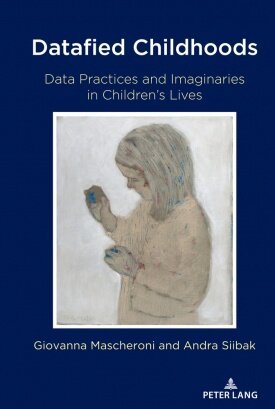
Making sense of the datafied world: a methodological guide (Kuidas mõista andmestunud maailma? Metodoloogiline teejuht), which was compiled and edited by Anu Masso from Tallinn University of Technology, Andra Siibak from the University of Tartu Institute of Social Studies and Katrin Tiidenberg from Tallinn University Baltic Film, Media and Arts School, was chosen as the best Estonian-language university textbook of 2020.
The compilation Making sense of the datafied world: a methodological guide will provide useful reading for anyone seeking to better understand the datafication processes – analysts, experts and decision-makers, students who are just beginning to work with data, as well as experienced specialists. In the book, 38 experts, professors and practitioners from various universities, research and development institutions and private businesses help to define the datafying world.
Additional information:
Andra Siibak, Professor in Media Studies, andra.siibak@ut.ee
Anu Masso, Associate Professor of Data Studies at Tallinn University of Technology, anu.masso@ut.ee
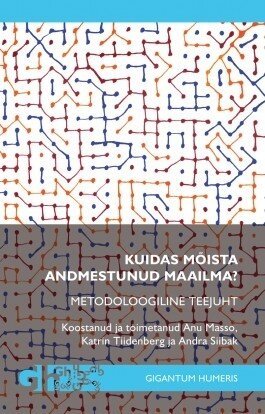
This book, compiled by over 30 scientists, provides a theoretical overview of political, economic, social and cultural breakthroughs in Europe and post-communist countries and tackles global transformation processes in the fields of economy and politics, transport, communication and media, as well as spatial relationships and value structure. In addition to a theoretical approach, readers of the book will also find examples of empirical studies and novel approaches to methods of study. The book was edited by Peeter Vihalemm, professor emeritus in media studies at the Institute of Social Studies, Anu Masso, senior researcher in data studies and visiting researcher at ETH Zürich, and Signe Opermann, researcher in media sociology. Several of the articles in the book were also authored by researchers at ISS.
The book can be ordered through the Routledge website.
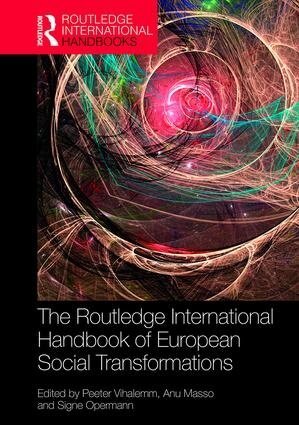
The Routledge Handbook on Consumption, edited by Dr. Margit Keller, senior researcher in social communication at the Institute of Social Studies, compiles the most notable results of research on consumption carried out by experts from several different fields. This compilation is highly recommended for anyone wishing to position their (scientific) work, explore new analytical discoveries and find potential new research matter. The structure of the compilation is intuitively thematical, addressing theory as well as methodology, markets and businesses, politics, culture and everyday life. It is an important read for all students and researchers in the fields of social and economic studies. In addition to editing, our researchers have also authored articles.
The book can be ordered through the Routledge website.
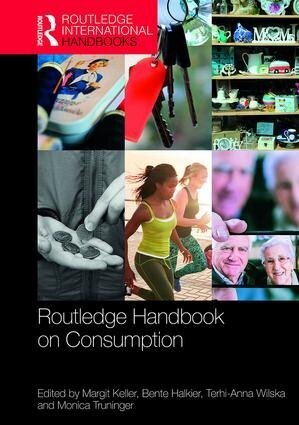
Estonian society in accelerating time (Eesti ühiskond kiirenevas ajas), a compilation of the findings of the survey “Me. The World. The Media” 2002–2014, provides an overview of the developments in Estonian society over the past few decades and discusses possible future directions. The book was edited by professor emeritus Peeter Vihalemm, professor (emerita) of social communication Marju Lauristin, professor of sociology Veronika Kalmus and professor of communication studies Triin Vihalemm from the Institute of Social Studies.
The survey took a detailed look at Estonia’s journey from the Soviet era to today (various periods of development); values and identities; assessments of change and life in the ESSR; the living conditions and social integration of various national groups; political and cultural activity; use of time and use of media; consumer practices; contacts with other countries; ways of integrating Estonia’s Russian-speaking population; differentiation between generations; trends and factors in stratification, etc.
This book will be of interest to researchers in social sciences and everyone who is interested in defining the developments which have occurred in Estonian society over the last decades, including policy makers, journalists, teachers of social science subjects, youth workers, etc. The book can be used as a textbook for students of social sciences.
The book can be ordered through the Krisostomus website.
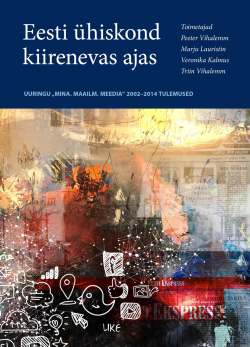
This collective monograph can be seen as a retrospective logbook of the long journey of the research group “Me. The World. The Media” (in Estonian “Mina. Maailm. Meedia”, abbreviated as MeeMa). The book offers a reflexive review of the long-term experience of researching the transformations in Estonian society, particularly by using the lens of social morphogenetic analysis developed by Margaret Archer and her co-workers. Specifically, the book aims to re-conceptualise the main results of the empirical studies from 2002 to 2014 by synthesising different theoretical perspectives on social change.
The book can be ordered through the University of Tartu Press website.
Additional information:
Veronika Kalmus, Professor of Sociology, veronika.kalmus@ut.ee
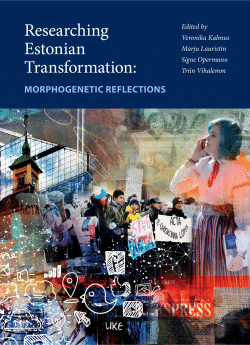
Child Vulnerability and Vulnerable Subjectivity explores child vulnerability in various contexts from a cross-country, comparative perspective. Combining approaches from psychology, sociology, law, educational sciences, social work, and media studies, the authors show how vulnerability in childhood develops within subjects in relationships with other people (other children, parents, specialists, such as teachers, social workers, and judges), how it is created by welfare, health care, education, and justice systems, and empowered by multiple crises, such as the COVID-19 pandemic, wars and natural disasters. The book is an important resource for academics, practitioners, and policymakers working on children's well-being.
The editors of the book were Associate Professor in Social Policy Dagmar Kutsar, Associate Professor of Empirical Sociology Mai Beilmann, and Research Fellow of Research of Social Well-being Oliver Nahkur from the Institute of Social Studies at the University of Tartu. The majority of chapters in the book were authored or co-authored by members of the institute's research groups: Dagmar Kutsar, Mai Beilmann, Oliver Nahkur, Associate Professor in Social Work Research Judit Strömpl, Lecturer in Social Welfare Kadri Soo, Professor of Sociology Veronika Kalmus, Research Fellow in Sociology of Media Signe Opermann, Kristi Paron who defended doctoral dissertation in sociology and Ukrainian visiting researcher and psychology doctoral candidate Yuliia Kravchenko. Also scholars from the University of Tartu’s School of Law – Research Fellow of Criminology Anna Markina, Associate Professor of European and Comparative Law Katre Luhamaa and former Analyst Beata Žarkovski – were involved in writing several chapters.
The book can be ordered through Springer Link.
Additional information: Dagmar Kutsar, Associate Professor in Social Policy, dagmar.kutsar@ut.ee

The research group raises two major questions: First, what is the monitoring capacity of the media landscape in 14 European countries? And second, what conditions must be met for the declared evidence-based media policy to be effectively implemented?
To address the first question, the Mediadelcom project has developed a concept for media monitoring along with a methodology for its measurement.
To answer the second question, a comparative analysis of the countries is presented, which shows that only the older democracies of Northern Europe (Germany, Sweden, Austria) possess sufficient knowledge about the dynamics of the media and journalism landscape to meet the necessary conditions.
Editors: Epp Lauk, Martin Oller Alonso, Halliki Harro-Loit, University of Tartu Press 2024.
A pdf version is available here.
Additional info: Halliki Harro-Loit, Professor of Journalism, halliki.harro@ut.ee.

The book seeks to answer the question of how the four dimensions of national media systems— the legal framework for freedom of expression and information, media accountability, journalism, and individuals' media usage and competencies— either contribute to or hinder the success of deliberative public communication.
This is a comparative study of the media systems of 14 European countries, employing the fsQCA (fuzzy set Qualitative Comparative Analysis), a method still rarely used in social sciences. Through a holistic approach, the authors demonstrate how various combinations of conditions and contexts create different matrices of risks and opportunities for European countries. The book aims to encourage readers to think beyond the influential yet contested "three media systems" model (Comparing Media Systems: Three Models of Media and Politics (2004) by Daniel C. Hallin and Paolo Mancini).
The Open Access version of this book is available at https://www.taylorfrancis.com and is made accessible under the Creative Commons [Attribution-Non Commercial-No Derivatives (CC-BY-NC-ND)] 4.0 license.
Editors: Zrinjka Peruško, Epp Lauk & Halliki Harro-Loit, Routledge 2024.
Additional info: Halliki Harro-Loit, Professor of Journalism, halliki.harro@ut.ee.
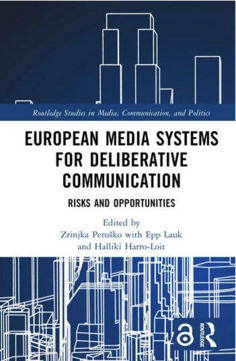
Building on the work of the authors’ previous volume, the Guidebook for Aligning Practices and Steering Multi‑System Change translates cutting‑edge theoretical concepts into the language and applied toolkits of change practitioners. This empirically grounded and theoretically sophisticated book provides policymakers and change‑managers methods and toolkits for conceptual modelling of change when handling cross‑sectoral issues.
The authors both ‘zoom in’ to the granular unfolding change of everyday life and ‘zoom out’ to examine the ‘big picture’ of socio‑technical systems such as energy, mobility, food and healthcare. In addition to the social practice theories introduced in the first volume, the authors draw on the multi‑level perspective that underpins sustainability transition studies and combine two theories. They are also inspired by the Deep Transition concept that tackles multi‑systems change. Bridging the gap between the theorisation of sustainability transitions and practical guidelines, it will appeal to policymakers, sustainability project managers and students of management, social and political sciences, technology and innovation.
The book was authored by Triin Vihalemm, Professor of Communication Studies at the University of Tartu, Margit Keller, Associate Professor of Social Communication, and sociologist Maie Kiisel.
The book can be ordered from the Routledge webpage.
Additional info: Triin Vihalemm, Professor of Communication Research at the University of Tartu, triin.vihalemm@ut.ee




